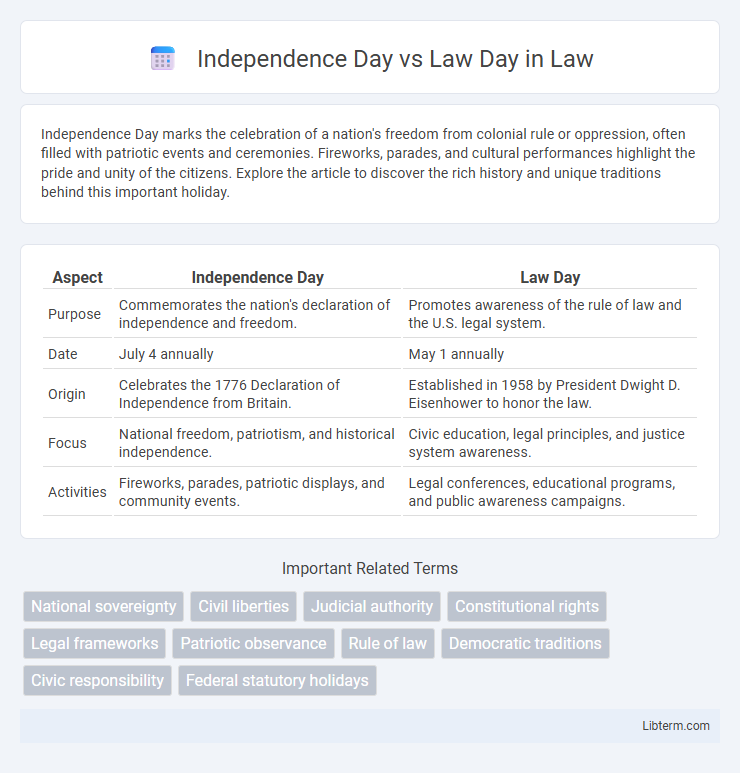Independence Day marks the celebration of a nation's freedom from colonial rule or oppression, often filled with patriotic events and ceremonies. Fireworks, parades, and cultural performances highlight the pride and unity of the citizens. Explore the article to discover the rich history and unique traditions behind this important holiday.
Table of Comparison
| Aspect | Independence Day | Law Day |
|---|---|---|
| Purpose | Commemorates the nation's declaration of independence and freedom. | Promotes awareness of the rule of law and the U.S. legal system. |
| Date | July 4 annually | May 1 annually |
| Origin | Celebrates the 1776 Declaration of Independence from Britain. | Established in 1958 by President Dwight D. Eisenhower to honor the law. |
| Focus | National freedom, patriotism, and historical independence. | Civic education, legal principles, and justice system awareness. |
| Activities | Fireworks, parades, patriotic displays, and community events. | Legal conferences, educational programs, and public awareness campaigns. |
Introduction to Independence Day and Law Day
Independence Day, celebrated on July 4th in the United States, commemorates the adoption of the Declaration of Independence in 1776, marking the nation's freedom from British rule. Law Day, observed on May 1st, highlights the importance of the rule of law and the role of legal institutions in maintaining justice and democracy. Both holidays emphasize distinct but complementary aspects of American history and governance, underscoring liberty and legal principles.
Historical Origins of Independence Day
Independence Day, celebrated on July 4th in the United States, marks the adoption of the Declaration of Independence in 1776, a pivotal document that declared the American colonies' separation from British rule. This day honors the revolutionary spirit spearheaded by figures like Thomas Jefferson, John Adams, and Benjamin Franklin, whose efforts culminated in the formation of a new nation founded on principles of liberty and democracy. Unlike Law Day, established in 1958 to promote awareness of the legal system and the Constitution, Independence Day's historical origins lie deeply rooted in the struggle for self-governance and national identity during the American Revolutionary War.
The Creation and Purpose of Law Day
Law Day was established in 1958 by President Dwight D. Eisenhower to promote public understanding of the legal system's role in American democracy. It serves as an opportunity to reflect on the importance of law in maintaining social order, protecting individual rights, and ensuring justice. Unlike Independence Day, which celebrates the birth of the nation, Law Day highlights the ongoing significance of legal principles in upholding the rule of law.
Key Values Celebrated: Freedom vs. Rule of Law
Independence Day celebrates the core value of freedom, honoring the historic struggle for national sovereignty and individual liberties. Law Day emphasizes the rule of law, underscoring the importance of justice, legal frameworks, and the protection of constitutional rights. These observances highlight the balance between liberty and legal order essential for a functioning democracy.
National Observance and Traditions
Independence Day, celebrated on July 4th, marks the United States' declaration of independence from British rule in 1776 and is observed with patriotic displays, fireworks, parades, and barbecues nationwide. Law Day, observed on May 1st, emphasizes the importance of the legal system in maintaining justice and democracy, featuring educational programs, court ceremonies, and public discussions on the rule of law. Both national observances highlight core American values through distinct traditions that foster civic pride and awareness.
Legal Significance of Law Day
Law Day, celebrated on May 1st, holds substantial legal significance as it honors the role of law in the foundation of the United States and emphasizes the importance of the rule of law in maintaining democracy. Unlike Independence Day, which commemorates the nation's freedom from British rule on July 4th, Law Day highlights the ongoing commitment to justice, legal education, and the protection of civil liberties. This observance fosters public understanding of constitutional rights, promotes legal fairness, and reinforces the principles that underpin American governance.
Patriotism and Civic Engagement on Independence Day
Independence Day celebrates the birth of American freedom with patriotic ceremonies, fireworks, and community events that inspire national pride and honor the founding principles of the United States. Law Day, observed on May 1st, emphasizes the importance of the legal system and civic responsibility, encouraging citizens to understand their rights and the rule of law. The patriotic spirit of Independence Day fosters active civic engagement by motivating individuals to participate in democratic processes and uphold the values of liberty and justice.
Symbolism and Iconography of Both Days
Independence Day features iconic symbols like the American flag, fireworks, and the bald eagle, representing freedom, patriotism, and national unity. Law Day highlights the scales of justice, the gavel, and the Constitution, emphasizing the rule of law and the importance of justice in democracy. Both days use powerful imagery to reinforce core American values, with Independence Day celebrating liberty and Law Day honoring legal principles.
Impact on American Culture and Society
Independence Day celebrates the birth of the United States and its foundational values of freedom and democracy, profoundly shaping American cultural identity through patriotic traditions, debates on liberty, and civic pride. Law Day highlights the American legal system's role in upholding justice, equality, and the rule of law, reinforcing the importance of constitutional rights and responsibilities in society. Together, these observances deepen national awareness of the balance between individual freedoms and legal frameworks essential to American governance and social cohesion.
Conclusion: Comparing Their Modern Relevance
Independence Day symbolizes national freedom and unity, deeply rooted in historical significance and patriotic celebration, while Law Day highlights the importance of legal principles and the rule of law in contemporary society. Both observances serve distinct yet complementary roles in fostering civic awareness and national identity. Their modern relevance lies in inspiring citizens to appreciate the foundations of democracy and actively engage in preserving freedom and justice.
Independence Day Infographic

 libterm.com
libterm.com